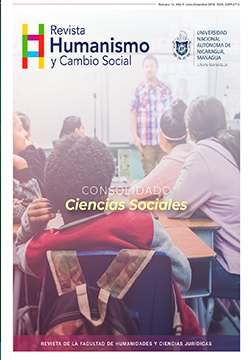Depresión en estudiantes becados internos de la Facultad de Ciencias e Ingeniería de la Universidad Nacional Autónoma de Nicaragua, UNAN-Managua, II semestre 2017
DOI:
https://doi.org/10.5377/hcs.v0i12.8823Palabras clave:
Depresión, jóvenes, instrumento, Escala Beck, estado de ánimoResumen
El presente artículo nace a partir de los resultados del estudio monográfico para optar al grado de Licenciatura en Psicología, que lleva por título Factores Sociodemográficos y Depresión en estudiantes becados internos de la Facultad de Ciencias e Ingeniería de la Universidad Nacional Autónoma de Nicaragua, UNAN-Managua, II semestre 2017, el cual tuvo como objetivo analizar los factores sociodemográficos y la depresión en estudiantes internos de la Facultad de Ciencias e Ingeniería de la Universidad Nacional Autónoma de Nicaragua UNAN-MANAGUA, II semestre 2017. En el presente, se plasma la cantidad de jóvenes con un Estado de ánimo depresivo y sus principales características sociodemográficas, tal información fue obtenida por medio del instrumento psicométrico Inventario de Depresión de Beck y una ficha de caracterización sociodemográfica, los cuales fueron aplicados a los estudiantes becados internos de la Facultad de Ciencias e Ingeniería. Este trabajo está conformado con una muestra de 56 personas que presentan algún nivel de Depresión, esto conforme a los resultados obtenidos del instrumento antes mencionado. En relación a los niveles de depresión experimentados por los estudiantes internos se concluyó que el 48.7% de los participantes presentaron un estado de ánimo Depresivo, de los cuales el 51.8% presenta una Leve Perturbación Del Estado De Ánimo y el 1.8% un nivel de depresión moderada; en cuanto a las características sociodemográficas, se destaca que las mujeres tienen más prevalencia en la manifestación de los estados depresivos, y el rango de edad de estos estudiantes oscila entre los 19 a 21 años, además, se destaca que la mitad de los participantes son solteros y sin hijos, en su mayoría trabajan.
Descargas
Citas
Aragón, S., Bastida, R., López, N., Rivera-A., Valor, I. & Valdez, J. (2017). Satisfacción marital y estado civil como factores protectores de la depresión y ansiedad. Revista Argentina de Clínica Psicológica, volumen XXVI, núm. 1, pp. 95-102. Recuperado de https://www.redalyc.org/pdf/2819/281950399009.pdf
Arros, A., Ferrel, R., & Hernández, O. (2011). Depresión y factores Socio Demográficos asociados en estudiantes universitarios De Ciencias de la Salud de una Universidad Pública (tesis de Doctorado, Universidad del Magdalena, Colombia) recuperado de http://www.scielo.org.co/pdf/psdc/n27/n27a03.pdf
Beck, A., Brown G. & Steer, R. (2009). Inventario De Depresión De Beck, Buenos Aires, Argentina: Paidós
Hervás, G., Hernán, L., Nieto Moreno, M. & Vázquez, C. (2006). Manual para la evaluación clínica de los trastornos psicológicos: trastornos de la edad adulta e informes psicológicos. España: pirámide
Instituto Nacional De Salud Mental. (2011) Las Mujeres y La Depresión. Geneenvironment. New York, Estados Unidos: Bar, J., Faraone, S., Tsuang, M. & Stone, S.
Montero, D. (2017). Análisis diferencial de salud Auto-Percibida, recilencia, perspectiva temporal futura y actitudes de género en adolescentes. Un abordaje desde la psicología positiva con perspectiva de género (tesis de doctorado, universidad de Complutense de Madrid, Madrid, España) Recuperado de http://eprints.ucm.es/46676/1/T39639.pdf
Naranjo, C. (2006). Causas sociales que inciden en la depresión. Santiago, chile
Organización de las Naciones Unidas para la Educación, la Ciencia y la Cultura. (2013). Situación Educativa de América Latina y el Caribe: Hacia la educación de calidad para todos al 2015. Santiago, Chile: Ediciones del Imbunche.
Ortega, Barros, Centeno (2011). Depresión y factores socio demográficos asociados en estudiantes universitarios de ciencias de la salud de una universidad pública (Colombia). Psicología del Caribe. Universidad del Norte, N°27:40-60.
Ospino, C. (2017). Propuesta de valor para la atención de personas con trastornos depresivos (Maestría En Administración De Empresas, Universidad Tecnológica De Bolívar, Cartagena, Colombia). Recuperado de https://biblioteca.utb.edu.co/notas/tesis/0073501.pdf
Organización Panamericana de la Salud, OMS. (2017). Depresión y otros trastornos mentales comunes. Estimaciones sanitarias comunes (PAHO/NMH/17-005)
Revista Española de Salud, (2000). Atención primaria de calidad, una buena práctica clínica de depresión y ansiedad. España: IM&C, S.A.




